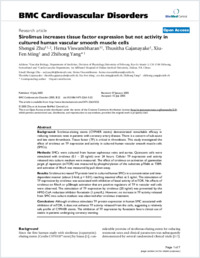Sirolimus increases tissue factor expression but not activity in cultured human vascular smooth muscle cells
- Zhu, Shengsi Vascular Biology, Department of Medicine, Division of Physiology, University of Fribourg, Switzerland - Cardiovascular Department, 1st Affiliated Hospital of Dalian Medical University, Dalian, China
- Viswambharan, Hema Vascular Biology, Department of Medicine, Division of Physiology, University of Fribourg, Switzerland
- Gajanayake, Thusitha Vascular Biology, Department of Medicine, Division of Physiology, University of Fribourg, Switzerland
- Ming, Xiu-Fen Vascular Biology, Department of Medicine, Division of Physiology, University of Fribourg, Switzerland -
- Yang, Zhihong Vascular Biology, Department of Medicine, Division of Physiology, University of Fribourg, Switzerland
-
17.07.2005
Published in:
- BMC Cardiovascular Disorders. - 2007, vol. 5, p. 22
English
Background Sirolimus-eluting stents (CYPHER stents) demonstrated remarkable efficacy in reducing restenosis rates in patients with coronary artery disease. There is a concern of sub-acute and late stent thrombosis. Tissue factor (TF) is critical in thrombosis. This study investigated the effect of sirolimus on TF expression and activity in cultured human vascular smooth muscle cells (SMCs).MethodsSMCs were cultured from human saphenous veins and aortas. Quiescent cells were stimulated with sirolimus (0.1 – 20 ng/ml) over 24 hours. Cellular TF expression and activity released into culture medium were measured. The effect of sirolimus on activation of mammalian target of rapamycin (mTOR) was measured by phosphorylation of the substrate p70s6k at T389, and activation of RhoA was measured by pull-down assay.ResultsSirolimus increased TF protein level in cultured human SMCs in a concentration and time-dependent manner (about 2-fold, p < 0.01) reaching maximal effect at 5 ng/ml. The stimulation of TF expression by sirolimus was associated with inhibition of basal activity of mTOR. No effects of sirolimus on RhoA or p38mapk activation that are positive regulators of TF in vascular wall cells were observed. The stimulation of TF expression by sirolimus (20 ng/ml) was prevented by the HMG-CoA reductase inhibitor fluvastatin (1 μmol/L). However, no increase in TF activity released from SMC into culture medium was observed after sirolimus treatment.ConclusionAlthough sirolimus stimulates TF protein expression in human SMC associated with inhibition of mTOR, it does not enhance TF activity released from the cells, suggesting a relatively safe profile of CYPHER stents. The inhibition of TF expression by fluvastatin favors clinical use of statins in patients undergoing coronary stenting.
- Faculty
- Faculté des sciences et de médecine
- Department
- Département de Médecine
- Language
-
- English
- Classification
- Biological sciences
- License
-
License undefined
- Identifiers
-
- RERO DOC 8188
- DOI 10.1186/1471-2261-5-22
- Persistent URL
- https://folia.unifr.ch/unifr/documents/300371
Statistics
Document views: 172
File downloads:
- pdf: 125
